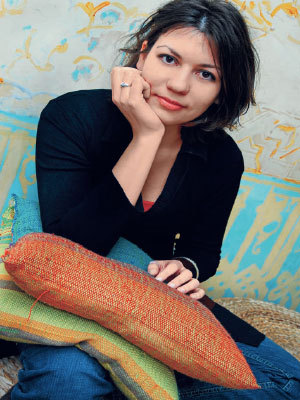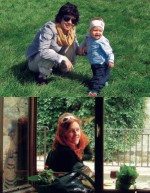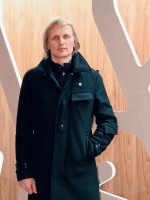Where did your love for singing come from? A love for music and singing was present in my life from an early age. It began to develop more through the Vali project, which I met when I arrived in Slovenia and in which I participated for many years.
Where did your love for singing come from?
A love for music and singing was present in my life from an early age. It began to develop more through the Vali project, which I met when I arrived in Slovenia and in which I participated for many years. We were a group of young people who began to discover the beauty of traditional Bosnian music. This is how a more or less permanent musical group was formed, in which I sang. I got to know the music through the eyes of the performer and realized that I liked it very much and decided to continue my singing career after the completion of the project.
Many of us think of turbofolk when we think of Bosnian music. What is traditional Bosnian music really like?
This association is wrong, as these are two completely different musical worlds. The music is called sevdah, after the Turkish word for love. As a result, the songs I sing are called sevdalinka - love songs. This musical genre came to the area of Bosnia with the occupation of the Turks about 500 years ago and accompanied the development of urban centers and culture. It's urban music. Many oriental elements can be detected in its structure, while the lyrics are mainly based on love themes. Sevdalinka were the only way of communication between the sexes in the conservative Muslim society of the time. Women were separated from men and this kind of communication united them. In the beginning, sevdalinka were often intended as a dialogue between a young man and a young woman, which were eventually set to music. In the development of sevdalinks, the topics discussed by sevdalinks also developed. This is how they later dealt with patriotic feelings, they could sing about social events, famous people of the time...
Where did you acquire your singing skills?
I'm more or less self-destructive. It's always good to be as open as possible in my work, so I draw inspiration from all genres of music and from different artists. I also trained my voice in this way with the musician Niki Vipotnik. I am greatly inspired by the masters of sevdah music: Himzo Polovina, Zaim Imamović, Emina Zečaj, ... You can use them all in your interpretation. But there are also many records from which you can draw texts and then try to interpret them in your own way as best as possible.
Is the way of singing sevdalink different from singing pop music?
This method is called "flat" singing, as it contains many flat tones, which are richly colored with melisma or ornaments. Interpretation carries the greatest weight when singing sevdalink. When singing sevdah, emotions play a big role, because they deal with passion, sadness, sadness, nostalgia... It depends on the singer himself, whether he will know how to convey the desired emotion to the listener and prepare him to empathize.
As a person, are you also eternally sad, melancholic - under the influence of the songs you sing?
Even if I'm sad, I doubt it's because of the song's influence. I'm not like that by nature. But from time to time I have moments of sadness, just like all of us. It's different when I step on stage. When I sing, I experience the music in my own way. Sadness then becomes a part of me, and we don't only have sad songs in our repertoire. That's when I approach a song in a completely different way, depending on what a particular song has to offer.
And you draw the energy for an experienced interpretation...?
From life, and from my own, definitely. When a new song is created, you go deeper into yourself, you find a place, a connection with past experiences. You ask yourself what you want to say with this song and in what way. My experiences, lived emotions, which you connect with and relive on stage, are there to support me.
How do audiences react to your music?
It depends. Most people experience our music in a very individual way. He tells something different to every listener, everyone experiences it in their own way, so the listeners connect their experiences, their emotions with what they heard. They can leave the hall full of emotions, be they nostalgic or sad, or full of positive energy.
You create together with the group Sedef. Is your music traditional to the point or do you give it a new, more modern touch, like the current trend in ethnic music?
Our basis comes from traditional Bosnian music, but we have given it a new, modern touch. Thus, we process the traditional song in the way we hear it. In our interpretation, modernity is intertwined with tradition. After the presentation of our new album in KD Kamnik, quite an extensive discussion opened up between traditionalists and those who are more open to changes and innovations. The first ones were a bit disappointed with the concert, as they expected a more traditional way of performing sevdah, but elsewhere we encountered an excellent reception from both Slovenian, foreign and Bosniak audiences. We had concerts here, at our neighbors, in France, and everyone welcomed us with open arms and ears. There is no end to the traditional versus modern debate. We think it is important that the song breathes with us.
Is there a Bosnian way of life and is it difficult to live in Slovenia?
I do not know. And even if there is, I don't know if I'm living it. If you think of some habits that we brought with us to Slovenia, it is drinking Turkish coffee, ha, ha. This is not just about pouring the coffee into yourself, but about slowly "sipping" it while chatting with friends.
Where can we hear you?
We will perform with guitarists Šemsudin Džopa and Tilno Stepišnik in early March in Ljubljana and April in Radovljica. We also collaborate a lot with other musicians. Thus, we are often accompanied at concerts by cellist Petra Onderufova, various percussionists, violinists, all of whom contribute additional value and uniqueness to the concert.
Where can we find you when you're not singing?
I'm happy to eat a tortilla or some salad in Romeo, have a coffee or some dessert in La Petit Caffe. Surprisingly, I don't like chevaps. We also like to have a drink or two with the members of the Sedef band at the Celica hostel on Metelkova, where we often perform. Otherwise, my best relaxation is singing, so I hope you will listen to me sometime and be a part of my story.





